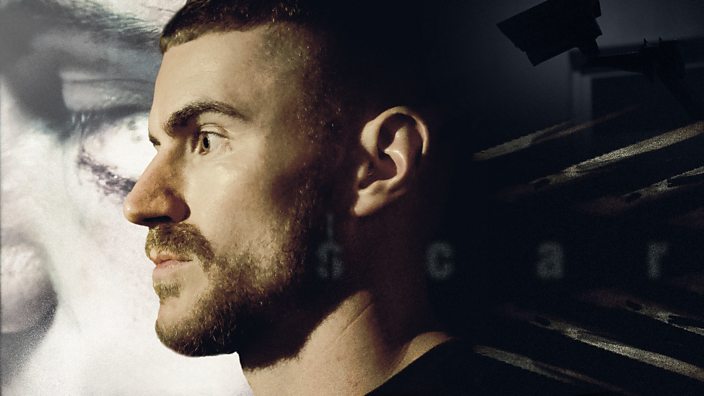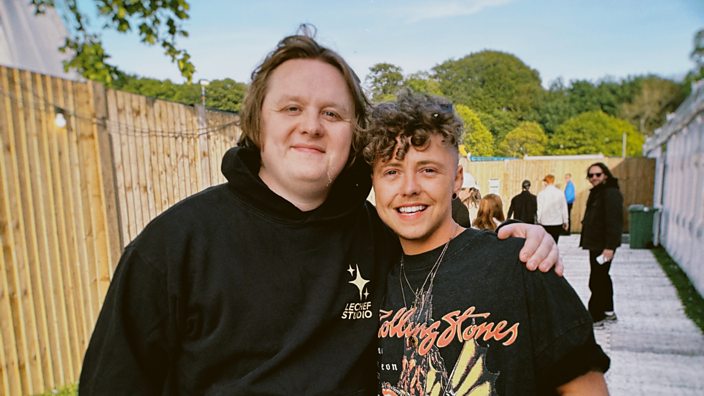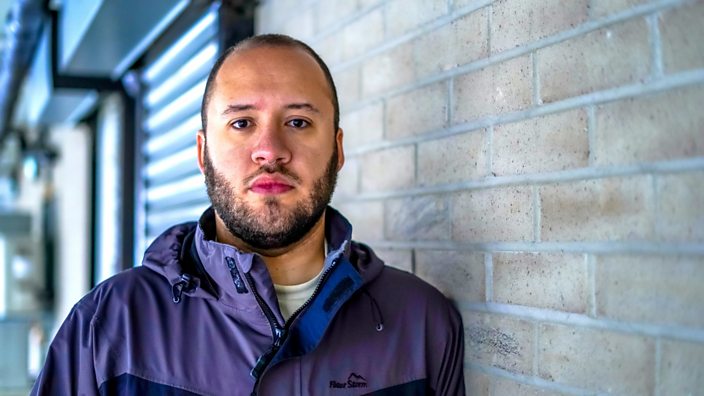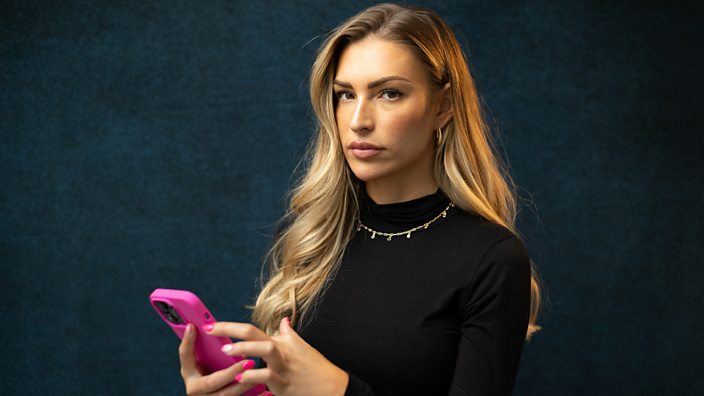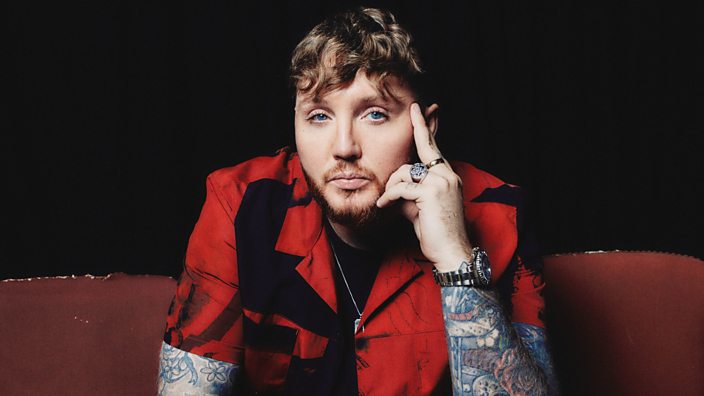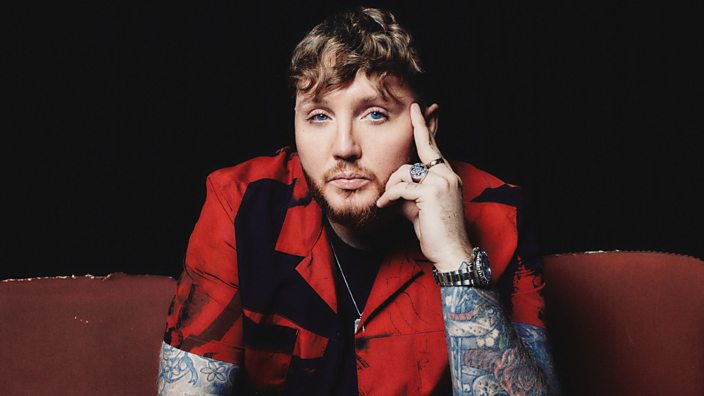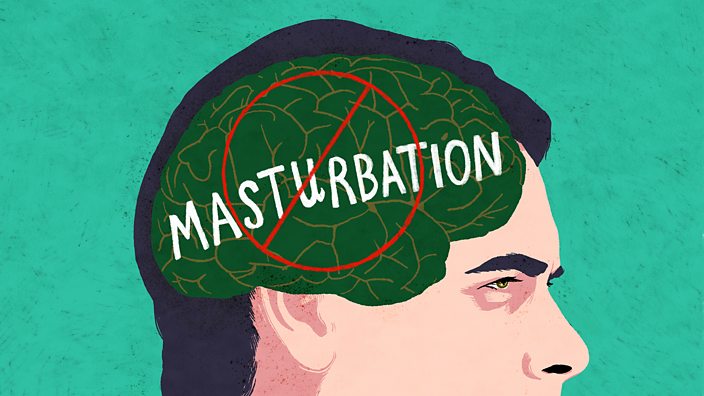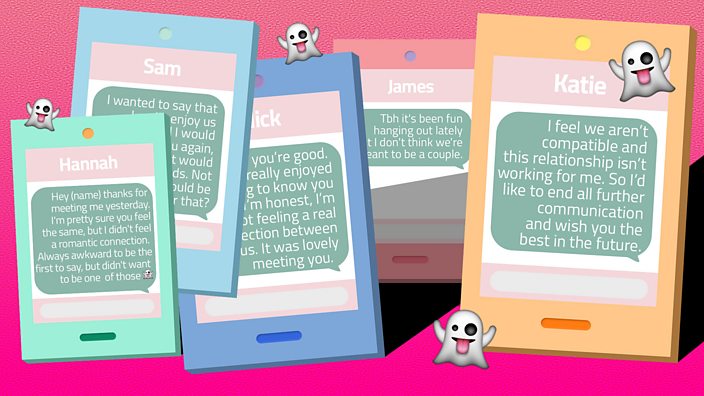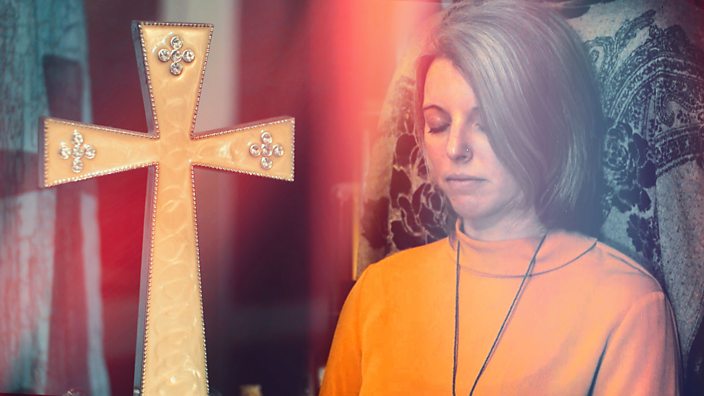 BBC
BBCMeet the young people who believe they’re communicating with the dead
Why are some millennials turning to the supernatural?
Warning: adult themes
Ashley Robinson, 36, closes his eyes and goes into a meditative state as he says: “Father God, help us to get a better understanding of the universe. May you bring forward our friends this evening, in love, light and harmony.” He draws a breath. “Giving evidence of life after death and the truths of spiritualism. Amen.”
Silence follows. I look around the room nervously. Everyone else’s eyes are closed.
Ashley turns to me: “Does the name Dave mean anything to you?”
“No… I don’t think so,” I reply, wracking my brain for anybody I might have known by that name who has died. Surprisingly to me, I want it to mean something.
“It’s important that you only answer ‘yes’ or ‘no’,” Ashley says quickly before I can say anything else.
The room is filled with large velvet armchairs that envelop you when you sit in them. It’s like being in someone’s living room. I’m surrounded by floral lampshades, crystals and diamante-adorned crucifixes. Books about seances, reincarnation, and the psychic life of dead pets line the walls.
I’m sitting in a circle with Ashley and three other young women: Ivymay, 26, who works at a local museum, Nichola, 29, a civil servant, and Charlie, 34, a learning and development worker.
I feel like I’m in a group therapy session. Despite having met these people less than an hour ago, I’m ready to share some of my most private feelings with them. But Ashley isn’t a therapist, he’s a medium. And we’re sitting in a quiet room at the back of the Wimbledon Spiritualist Church, which stands on an unremarkable suburban street in south west London.
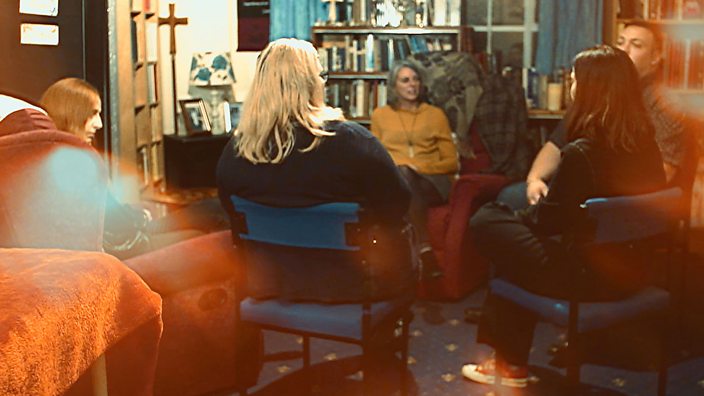 BBC
BBCYes, you read that right. Ashley is a medium, which means he claims to communicate with the dead (or, as he calls it, the “spirit world”). He says he acts as a conduit to help people hear from loved ones they’ve lost. Unlike psychics, who claim to make predictions, mediums only claim to pass on messages. “I’m like a radio tuning into different frequencies,” he says, “and I don’t always remember what I’ve heard when it’s over”.
“Okay,” says Ashley, closing his eyes again. “I’m asking Dave to move on. I’ve got another older man here. I think he has breathing difficulties… does this mean anything to anyone? Remember, only answer ‘yes’ or ‘no’ please.”
Charlie’s face lights up at the mention of ‘breathing difficulties’. Ashley turns to her and continues to deliver information.
“What about 17 December… as an anniversary?” Ashley asks.
“Oh, yes,” Charlie says, beaming and playing with the purple crystal hanging around her neck.
This man, she thinks, is her dead grandfather, communicating with her from beyond the grave. And 17 December? Well, she tells us, that’s when her family will come together, throwing a party with him in their thoughts.
“He wants you to know he’s OK, and that he loves you,” Ashley says. “That was your message.”
Charlie looks relaxed but elated. Silence descends again.
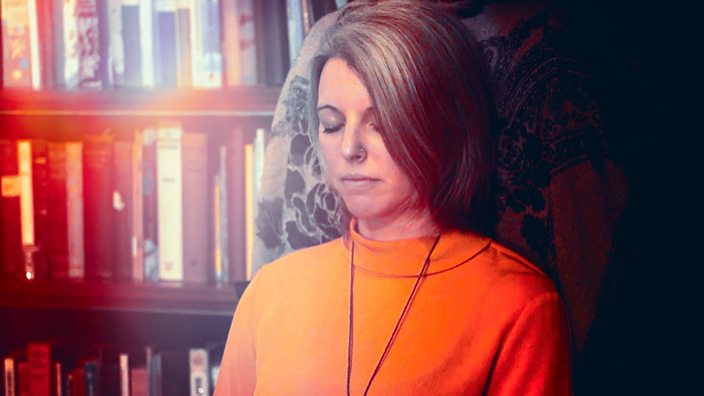 BBC
BBCCommunicating with the spirit world, or “hearing spirit” as Ashley calls it, is something he claims to have been doing since he was a child. “At first it was like hearing a foreign language. I started training when I was 18 but didn’t start working until I was 25,” he says. Ashley claims that he has always heard from spirits, but that he became “closer” with them after suffering a major stroke in his early 20s. The stroke killed a third of the brain cells on the left side of Ashley’s brain, and he thinks his closeness with the spirit world “assisted” his recovery. These days, he works full-time as a civil servant and does his mediumship in the evenings and on weekends.
Today, the Spiritualists’ National Union of Great Britain estimates that they have around 11,500 members throughout the UK attending their 340 churches to try to communicate with the spirit world via mediums, a number which, they claim, has been bolstered by a surge in interest from younger generations. The number of people in England and Wales who identified their religion as ‘Spiritualist’ rose by 22% between the 2001 and 2011 censuses.
Ashley closes his eyes again. The atmosphere in the room is emotional but calm. Far from seeming spooked, the others appear enlivened by the ‘presence’ of their loved ones, while I oscillate between excitement and cynicism.
My nan died last year. It wasn’t totally unexpected but, still, there were things left unsaid. It’s not something I’ve really spoken to anyone about, but seeing how reassured Charlie is after receiving her ‘message’, my mind wanders.
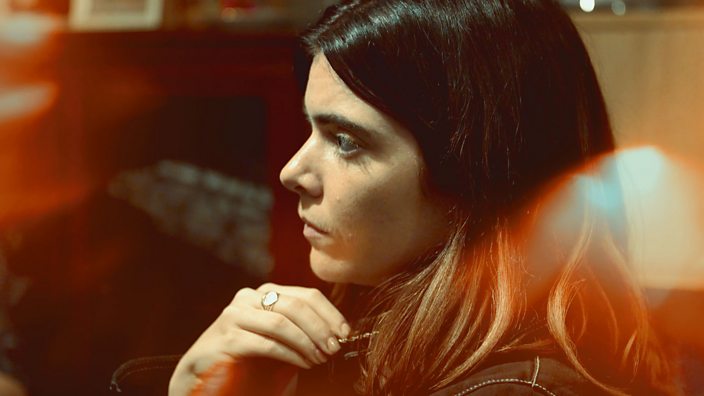 BBC
BBCI start thinking about the conversations I would have with my nan if she were still alive. For instance, I know little about her childhood or why she’d always wished I’d become a teacher and not a journalist. I feel suddenly apprehensive - are some things better off left alone?
Next, Ashley says he has a message for Nichola, that she thinks is from her recently-deceased grandfather. I watch her break into a relaxed smile as Ashley’s clues apparently lead her to a lightbulb moment.
“I’m seeing bricks,” Ashley tells her. “They’re stacked up, one side is taller than the other. He wants you to keep building yourself up… he knows that people have underestimated you, and he’s so proud of what you’ve overcome”.
I feel emotional. It’s not even my message. Nichola is nodding. She seems reassured by what Ashley is saying.
I’m like a radio tuning into different frequencies.
Ashley Robinson, medium
You might know what’s going on here as a seance. It’s exactly as you’d imagine, except there are no candles. Instead, battery-powered LED flames flicker around us. “It’s a health and safety thing,” Ashley says. “Burning candles would have pushed our insurance up too much.”
As the reading draws to a close, I ask Nichola what it felt like to supposedly get a message from the spirit world. “It’s exciting,” she says. “It’s a buzz. The best way to describe it is a feeling of pure delight.”
Of course, there’s no way of proving whether or not she has received a message from the spirit world but, when I press her, that’s what she claims to believe.
Spiritualism - as practiced by Ashley at the Wimbledon Church - is a religion dating back to 1848. It began when two American sisters, Maggie and Kate Fox who were aged 11 and 15 respectively, said they could communicate with the ghost of a man murdered in their home years before their family moved in. News of their supposed gift spread far and wide and they quickly became famous. Despite being dogged by claims of fraud, the sisters’ public appearances attracted packed crowds eager to witness their supernatural powers in action. Meanwhile, Spiritualism’s popularity grew around the world.
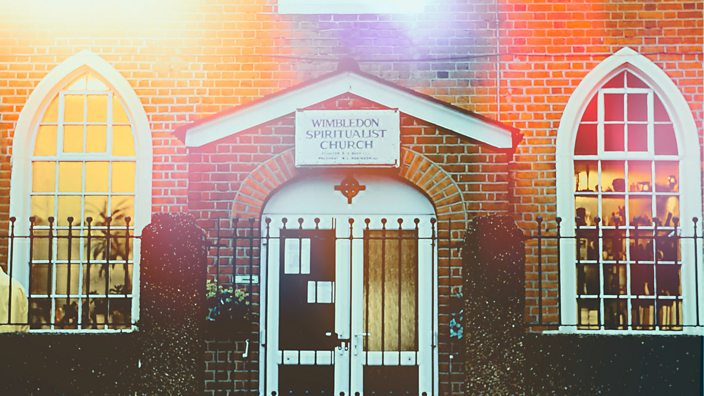 BBC
BBCBy the late 1800s, it had arrived in the UK, drawing devotees from across the social spectrum. Queen Victoria herself was said to have participated in seances, while Sherlock Holmes creator Arthur Conan Doyle and the celebrated biologist Alfred Russel Wallace were among the movement’s most high-profile followers. Not even the confession in 1888 by Maggie Fox, that she and her sister had faked it all along, did much to dampen its appeal. Interestingly, spiritualism back then was also specifically popular with women, who were deemed more ‘spiritual’ than men, and so got to adopt leading roles denied to them in other religions.
Today, Spiritualism is defined as a religious movement with rituals and beliefs practised by those who follow it. Its central belief is in life after death and the existence of a soul, which lives on long after our physical bodies die. That might not sound so different to more mainstream religions like Christianity, Judaism and Islam, but it diverts from them with the controversial claim that mediums can contact the dead.
Almost since its inception, people have publicly exposed the techniques used by mediums who claim to be passing on messages from the dead. Famous debunkers include the magician Harry Houdini, who campaigned to expose “fraudulent leeches” as he called them in the 1920s, through to the modern illusionist Derren Brown and former magician and escapologist James Randi, whose life story was the subject of an award-winning documentary in 2014.
“I would make a big distinction between those who are deliberate con artists, which I suspect is a minority, and those who genuinely believe that they have a gift,” says Professor Chris French, who leads a research unit into paranormal beliefs at Goldsmiths University.
“Whenever this kind of thing is put to the test, under properly controlled conditions, even those mediums who genuinely think they have a gift don’t seem able to do what they claim. Although, I genuinely think they are sincere. So, the question is - what’s going on when people go for a reading?"
Prof French goes on to explain about the concept of “cold reading”, a technique that can be used to convince complete strangers that you know all about them. Anyone who is interested can buy books and train themselves in it.
“A component of it is called the 'Barnum Effect’, which refers to statements you can make about a person that sound like you have insight into their innermost personality," he says. "But, in reality, these statements are pretty generic. An example is, ‘I’m sensing that you’ve achieved quite a lot in life, but there’s so much more you could achieve if you could just tap into that potential’. And we all think, ‘Yes, yes, that’s me’."
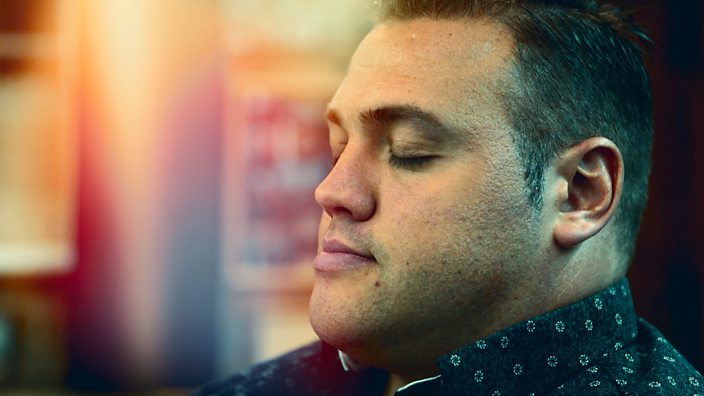 BBC
BBCI challenge Ashley on this. I ask him whether he charges for services and what he would say to someone who doesn’t think anyone can actually communicate with the spirit world. He says that in every reading, for which he charges about £20 for 20 minutes, he will ask for “proof” from the spirit world and offer it to the person receiving the reading. They then have the choice whether or not to believe the message he is delivering.
“Everyone is entitled to their own honestly-held belief,” he says. “But we ask that anyone who comes into the church does so with an open mind, the space and capacity to receive evidence of life after death and, above all, the respect for other people and their beliefs.”
Today, it seems Spiritualist practices are booming. Last August, it was reported that the owners of tarot card deck, Motherpeace Tarot, which was created in the 1970s in the US and is now sold internationally, had seen a 268% boom in sales in the previous six months. Astrology app Co-Star has attracted more than a million users since it launched in 2017. Last year, the US psychic services industry made $2bn in revenue, a 2% increase from five years previous.
In an age when we have easy access to more scientific information than ever before, why are we increasingly interested in practices that are unproven? Prof French believes that an increased interest in practices like these - which he categorises under the umbrella of “magical thinking”- is linked to political uncertainty. “We turn to ‘magical thinking’ at times of great uncertainty,” he says. “And that’s very, very relevant given that we’ve got Brexit perhaps happening, perhaps not. I personally don’t think I’ve ever known a time of such political uncertainty and extremism as we’re going through at the moment.”
He adds that the popularity of astrology and mediumship also grew in the lead-up to the Second World War: “The idea is that at times of uncertainty, anything that gives at least the illusion of control is going to be psychologically comforting.”
But why the increased interest from the younger generation in particular? "Spiritualism now interests a much younger audience,” Annie Blair, general manager of the Spiritualists’ Association of Great Britain, tells me. “It’s very apparent with the new visitors to our headquarters in Battersea. Young people, especially in their twenties, are attending our workshops, daily demonstrations of clairvoyance, and our Sunday divine service where mediums communicate with the spirit world."
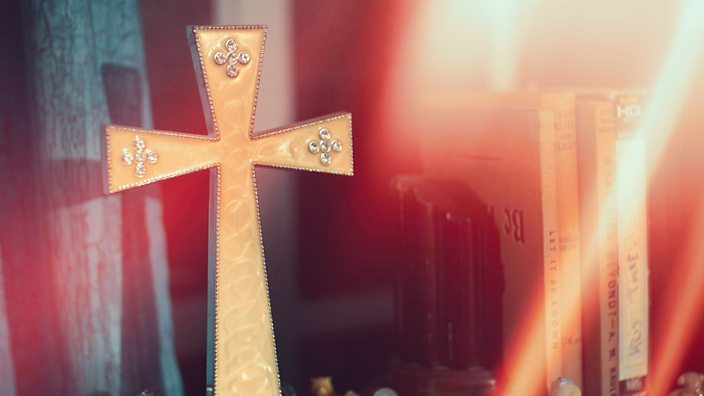 BBC
BBCThis, Ashley says, rings true at the Wimbledon Church, too. “We’re seeing young people come through the door who might not have come before, who have no family connection to the church whatsoever, but just want to see what we’re about.”
I have my own suspicions as to why this might be, but Ashley doesn’t share them. My hunch is that social media has allowed young people (mostly women) to come together and form a new culture of spirituality which centres on women’s power.
A quick scroll through Instagram will reveal millions of posts on each subject. Type #witch into the app’s search bar and you’ll see more than seven million posts showing everything from selfies to magic potions. Try #crystalhealing and there are over two million posts about the various powers of different rocks. For #spirituality there are nearly 8 million posts, showcasing all of the above with some yoga and meditation thrown in. There are also hundreds of thousands of posts about seances.
...at times of uncertainty, anything that gives at least the illusion of control is going to be psychologically comforting.
Professor Chris French, Goldsmiths University
While newspapers and magazines have, for years, published horoscopes and astrology content, their popularity and prominence has grown in recent years. In 2015, Broadly - VICE’s women-focused offering - launched in the US and UK, with a dedicated horoscopes' section. And in 2017, the horoscopes published on The Cut, a US website also aimed at young women, saw a 150% spike in hits on the previous year. Independent magazines, like Sabat which is devoted solely to witchcraft, have also sprung up.
While spiritualism is a religious movement, witchcraft has historically been viewed as a more individualistic occult practice, and is used to try to bring about healing or gain understanding about our lives and the future.
When Donald Trump became President, women all over the world came together online to ‘hex’ him, encouraged by the likes of Lana Del Rey. During last year's Brett Kavanaugh Supreme Court confirmation hearings in the US, women in New York ‘hexed’ him. Cult classic witchy TV shows such as Charmed and Sabrina have also been rebooted over the past year.
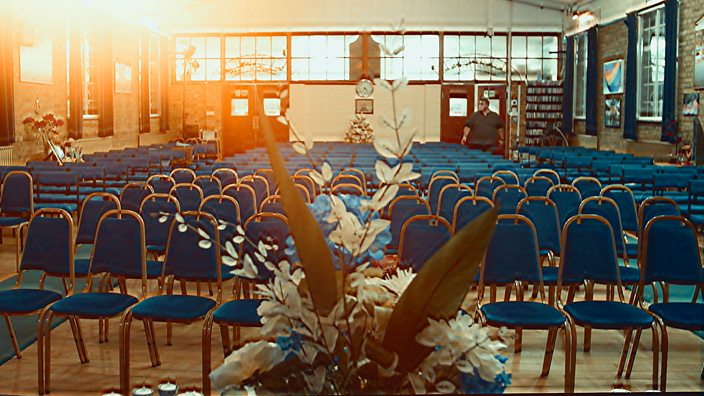 BBC
BBCThe day before I visited the ‘seance’, I interviewed Diane Purkiss, an Oxford University professor and the author of The Witch in History. She said that contemporary witchcraft - the hybrid culture we’re seeing on Instagram of spells, tarot, clairvoyance and astrology - is a reaction to sexism, stress and, in our increasingly digital lives, a way to connect spiritually with other women. There is, she said, “a very big gap between the women who were accused of being witches in the Middle Ages and the new age techno-pagans of today.”
In a post-industrial world where we are increasingly shut off from nature, sitting down indoors all day, Diane believes “people are using their spare mental energy to create other worlds and ways of being”. Connection was a recurring theme in Diane’s research. “I spoke to a lot of witches who worked in IT-based jobs. Witchcraft offered them a relief, a link to a past before the digital age and a link to the natural world,” she explained.
I told Diane that I have visited a medium myself on the recommendation of a friend and confess that I have crystals by my bed, even though I’m not really sure what they do.
“I think you’re an unconscious participant in what’s effectively a new religion that’s being created by young women today because they’re dissatisfied with the old religions,” Diane said matter-of-factly.
While Ivymay and Charlie are happy to participate in the activities associated with Spiritualism, they stop short of calling themselves ‘Spiritualists’. Like many of their generation, they prefer a more pick and mix version of spirituality than aligning themselves with a particular religion.
“I would say that I’m definitely spiritual and not religious,” Nichola says. “I don’t hold to one belief system and that gives me the freedom to merge different ideas about life and death.”
Ivymay agrees. “I practise my own relationship with spiritualism about once a week and it’s something beyond worrying about work or my finances, which is just for me,” she explains once Ashley’s readings are complete.
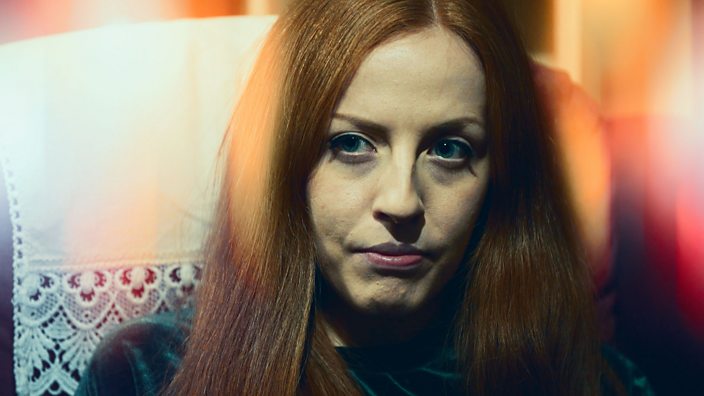 BBC
BBCCharlie, too, sees herself this way. “I don't class myself as religious,” she tells me. “I grew up going to church with my grandparents but I think, if you strip it back, it's all the same - connection, unity, love, community, kindness. Whether that's Catholicism, Hinduism, Buddhism, yoga or [insert any religion] feels besides the point."
None of these young women have encountered any negative reactions. Quite the opposite, their friends are keen to get involved. “I’ve got a large friendship group,” Ivymay explains. “And, while not all of them would come to a church, they all believe that there is ‘something’ after you die. So, if I have a reading, I can walk into the pub and say, ‘You’ll never guess what I just got’, and we can chat about it.”
Charlie, meanwhile, has dedicated an entire Instagram account to the spiritual side of life where she posts about Reiki, yoga, full moon cleanses, tarot, and crystals.
It’s difficult to pin down exactly what it is these women believe, because it is not concrete. They do not subscribe to a prescribed belief system. Instead they’re drawing on the values of other religions and creating something for themselves. Connecting with lost loved ones in the tradition of Spiritualism is just one part of that, albeit it a key part.
Charlie lost her dad suddenly at the end of last year. “I wasn’t prepared for it,” she explains. “I mean, who is?”
However, she does think that her involvement with Spiritualism has provided solace. “There is no escaping grief. It sucker punches you right in the gut,” she explains. “I was distraught. Whether you’re spiritual or not there's still the rawness and grief process that can only be healed by acceptance, love, and time. However, I know that, through Spiritualism, by communicating with the spirit world, there will be an opportunity to heal for both me and my dad. That helps enormously.”
In an age when the internet gives you the impression that everything can be accounted for, 'what happens when you die?' is one of the few mysteries we have left. Some researchers argue that consciousness itself doesn’t die with our bodies but, rather, it moves on. However, Ashley says that, for Spiritualists like him, what goes on here, in Wimbledon, is proof enough that there is life after death.
So perhaps what’s important here is not whether or not we can say without doubt that there is an afterlife, but what happens when people come together to contemplate their lives and remember those they’ve lost.
I have known Ivymay, Charlie and Nichola for an hour and I feel closer to them already than I do to some people I’ve known for years.
These women, who were strangers until we met in Wimbledon, now know that I was devastated when my nan died last year, that someone I cared about died young from cancer, and that, while I might be sceptical about, well, pretty much everything, I’m excited by the idea that they are taking the parts of different religions and belief systems which speak to them and building something for themselves.
I left Wimbledon Church having had one of the most frank discussions about life and death I’ve ever had. In fact, I think I’ve spoken more with these four relative strangers about dying, ghosts, and spirituality than I ever have with anyone.
I might, personally, not believe in a spirit world or life after death, but, perhaps, that’s not the point. If crystals, mediums, spells and Ouija boards help us to open up and come to terms with our mortality then, surely, that’s not so different to what other religions have been doing since, well, the dawn of time?
I’m not convinced that I received a message tonight, but I spoke about the loss of my nan and it felt good. I realised that I’m still grieving. As the old saying goes, the medium is the message. In this case, the message is that these young women want to engage with ideas much bigger than themselves, support each other, and talk about grief. They’re creating new traditions and communities while they’re at it.
On the way home from Wimbledon I think of something that Professor Diane Purkiss said to me when I interviewed her. “I do think that it’s totally made up, but I also want to stress this: I think it’s great.”
This article was originally published on 1 March
